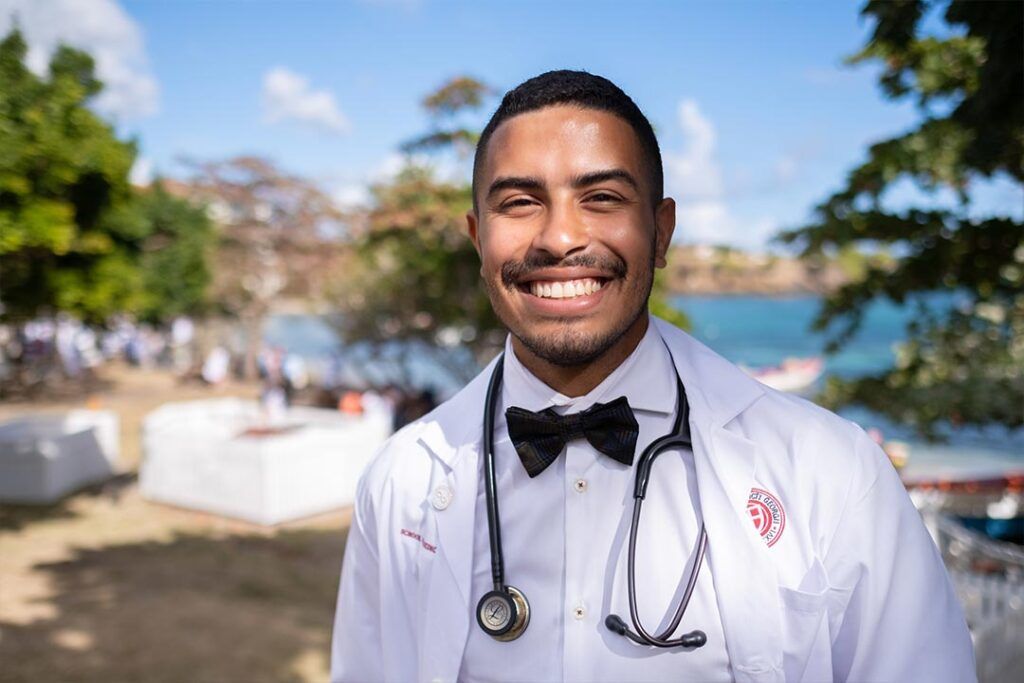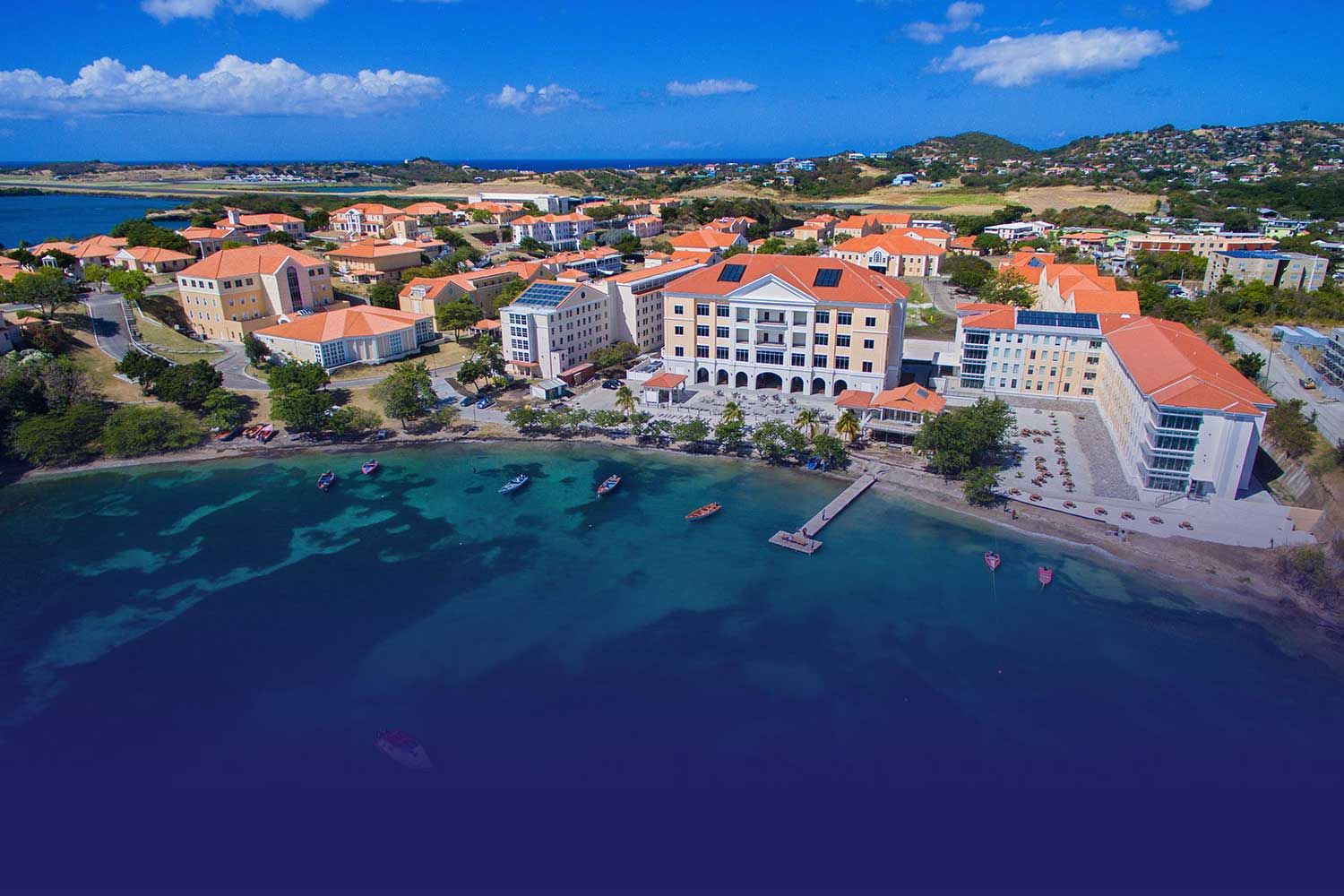Program Overview
Program
Students without a bachelor’s degree may earn a BSc after year one of the MD program, if accepted into the BSc/MD track. Eligibility depends on entry point and acceptance into the BSc/MD program.
Locations
Years 1-3: Preclinical coursework in Grenada
Year 4-5: Basic Science coursework in Grenada
Years 6-7: Clinical training in affiliated hospitals in the US or UK
Entry Terms
April, August, or January
Next Start Date:
April 2026 (Grenada)
January 2026 (UK)
View All SGU
Medical Programs
The dual Bachelor of Science/Doctor of Medicine Degree (BSc/MD) program is designed for students in the preclinical phase of MD program who do not hold a first degree and wish to earn a Bachelor of Science degree at St. George’s University.
Students who enter the University in the first or second year of the preclinical track may earn a bachelor’s degree upon acceptance into and completion of their first year of the four-year MD program.
Students who directly enter the third year of the preclinical track (with Advanced Levels or an International Baccalaureate) have to complete additional coursework to be eligible for this degree. Applicants interested in this program will be evaluated for transfer credit.
Only qualified students who are enrolled in the BSc/MD degree program will be eligible to receive a Bachelor of Science degree at the end of the first year of the four-year MD program.
Dual-Degree Program Admission
Dual degrees to give your medical training an even greater impact.
Candidates interested in our dual-degree program must submit an application for entry into St. George’s School of Medicine and include the Graduate Addendum.
Dual-degree candidates will be reviewed by the Committee on Admission for the Medical program first before consideration is given to the graduate degree requirements.
Upon acceptance, an interview will be conducted by an appropriate representative of the requested program of study, and the Dean of Graduate Studies and faculty members will review the request for the dual-degree program.
Academic Outcomes
Students from across the world come to St. George’s University for a rewarding education with global impact.
Average of 2020, 2021, 2022, 2023 and 2024 residency placement rates. Residency placement rate is defined as the total number of students/ graduates who obtained a US residency divided by the total number of students / graduates who applied to a US residency program in a given year as of October 2024.
95%
US residency placement rate for US graduates over the last five years.
Click here to view qualifying data

Average of 2020, 2021, 2022, 2023 and 2024 residency placement rates. Residency placement rate is defined as the total number of students/ graduates who obtained a US residency divided by the total number of students / graduates who applied to a US residency program in a given year as of October 2024.
1,049+
US residencies in 2025. No other medical school in the world provides more new doctors to the US healthcare system.
Click here to view qualifying data

Average of 2020, 2021, 2022, 2023 and 2024 residency placement rates. Residency placement rate is defined as the total number of students/ graduates who obtained a US residency divided by the total number of students / graduates who applied to a US residency program in a given year as of October 2024.
82%
Pass rate of SGU students from the US taking the USMLE Step 1 for the first time 2020-2024 had an 82% pass rate
Click here to view qualifying data

Average of 2020, 2021, 2022, 2023 and 2024 residency placement rates. Residency placement rate is defined as the total number of students/ graduates who obtained a US residency divided by the total number of students / graduates who applied to a US residency program in a given year as of October 2024.
89%
Pass rate of SGU students from the US taking the USMLE Step 2 for the first time 2021-2025.
Click here to view qualifying data

Curriculum
There are a range of entry points into our Doctor of Medicine program, accommodating applicants of all educational systems and academic backgrounds.
Preclinical Year 1
Preclinical Phase
34 Credit Hours
BIOL 320: Human Biology/Lab
4 Credits
BIOL 221: General Biology/Lab
4 Credits
CHEM 122: General Chemistry I
3 Credits
CHEM 124: General Chemistry II
3 Credits
PSYC 201: Introduction to Psychology
3 Credits
MATH 120: College Math
3 Credits
COMH 115: Health Education
3 Credits
ENG 213: College English
3 Credits
Elective
3 Credits
Preclinical Year 2
Preclinical Phase
35 Credit Hours
BIOL 101: Anatomy and Physiology I
4 Credits
BIOL 202: Anatomy and Physiology II
4 Credits
COMM 302: Public Speaking
3 Credits
MATH 220: Statistics
3 Credits
NUTR 201: Nutrition
3 Credits
PSYC 316: Health Psychology
3 Credits
PUBH 302: Public Health
3 Credits
Preclinical Year 3
Preclinical Phase
40 Credit Hours
BIOL 320: Genetics
3 Credits
BIOL 401: Microbiology/Lab
4 Credits
BIOL 441: Physiology/Lab
4 Credits
BIOL 460: Human Anatomy
4 Credits
PCLN 380: Clinical Cases
2 Credits
PSYC 411: Intro to Psychopathology
3 Credits
Academic Year 1
Term 1
BPM 500: Basic Principles of Medicine I
BPM 500: Basic Principles of Medicine I (BPM1)
- Foundation to Medicine (FTM): 6 weeks
- Musculoskeletal System (MSK): 4 weeks
- Cardiovascular, Pulmonary and Renal Systems (CPR): 7 weeks
Term 2
BPM 501: Basic Principles of Medicine II
BPM 501: Basic Principles of Medicine II (BPM2)
- Endocrine and Reproductive Systems (ER): 3 weeks
- Digestive System and Metabolism (DM): 4 weeks
- Nervous System and Behavioral Sciences (NB): 11 weeks
Academic Year 2
Term 3
BPM 502: Basic Principles of Medicine III
BPM 502: Basic Principles of Medicine III (BPM3)
6 weeks with four thematic areas:
- Basics of Immunology and Microbiology
- Public Health Assessment Tools
- Culture and Societal Issues/Physician-Patient Relationship
- Ethics, Professionalism and Medical Jurisprudence
Term 4
PCM 500: Principles of Clinical Medicine I
PCM 500: Principles of Clinical Medicine I (PCM1)
- Foundations to Clinical Medicine (FTCM): 4 weeks
- Neurological, Cardiovascular, and Renal Systems Module (NCRS): 6 weeks
- Respiratory, Hematopoietic, and Pediatric Systems (RHPS): 4 weeks
- Digestive, Endocrine, and Reproductive Systems (DERS): 6 weeks
Term 5
PCM 501: Principles of Clinical Medicine II
PCM 501: Principles of Clinical Medicine II (PCM2)
- Musculoskeletal System and Infections: 4 weeks
- Cardiology, Pulmonology, Renal, and Hematology: 4 weeks
- Gastroenterology, Obstetrics, Endocrinology, and Reproductive: 4 weeks
- Dermatology, Neurology, Psychiatry, and Rheumatology: 4 weeks
Academic Years 3-4
Core Rotations
42 Weeks
Academic Year 3
Internal Medicine
12 Weeks
Surgery
12 Weeks
Psychiatry
6 Weeks
Obstetrics/Gynecology
6 Weeks
Pediatrics
6 Weeks
Family Medicine
6 weeks (may be taken in Year 4 dependent on clinical placement)
Sub-Internships and Electives
38 Weeks
Academic Year 4
Medicine Elective
4 Weeks
Medicine Subinternship
4 Weeks
Additional Electives
24-26 Weeks
Real Questions. Real Answers.
Hear directly from SGU students and grads as they share honest answers to the most common questions about studying medicine at SGU.
MD '08, MSc '20
Investing In Your Future
SGU’s medical school tuition compares favorably with other top medical schools — and we offer scholarships and other financial aid assistance.
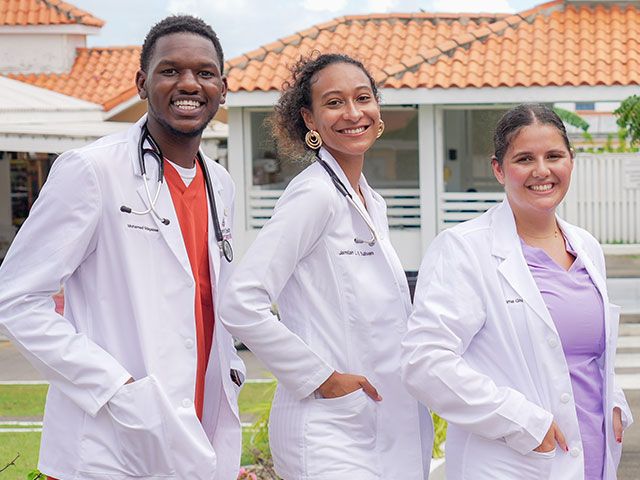
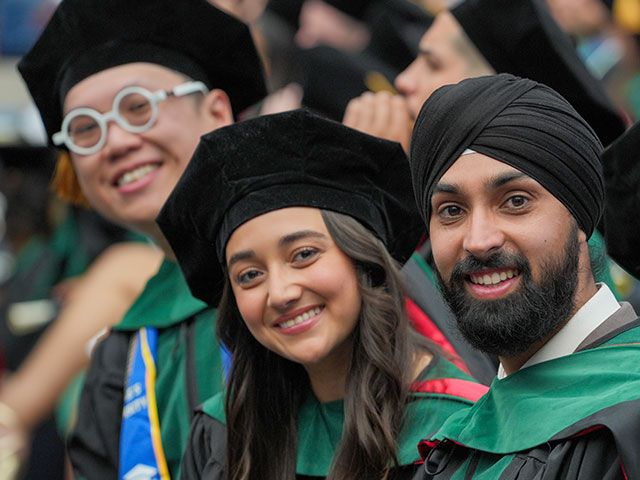
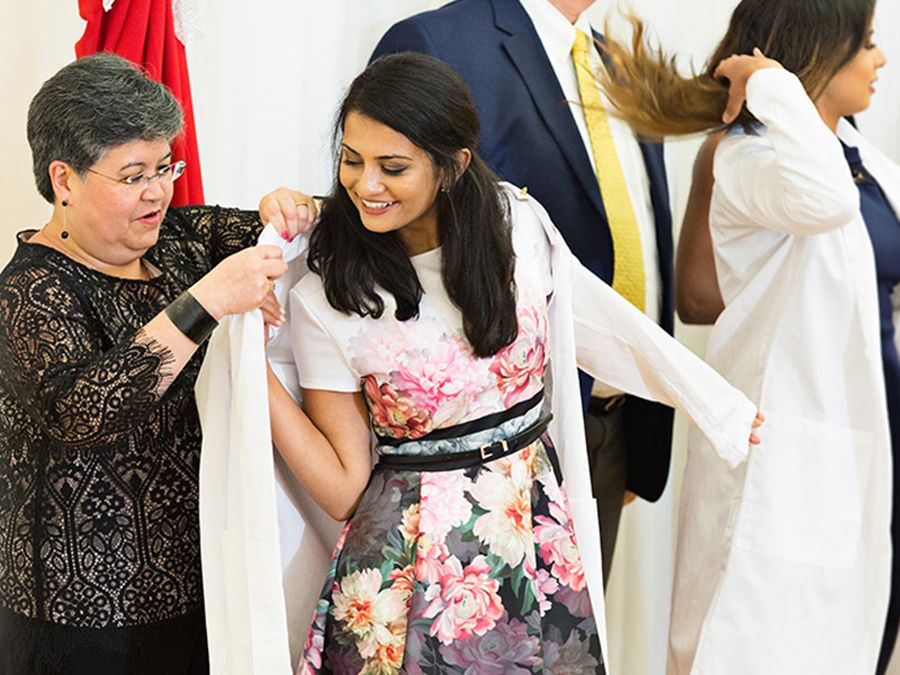
From Dr.eam To Doctor
Learn more about our MD program and tracks
Every aspect of our MD program and tracks are intentionally designed to support you on your path to becoming a physician.
Flexible Start Dates: Choose from multiple entry terms in April, August, or January to begin your medical education at your convenience.
Average of 2020, 2021, 2022, 2023 and 2024 residency placement rates. Residency placement rate is defined as the total number of students/ graduates who obtained a US residency divided by the total number of students / graduates who applied to a US residency program in a given year as of October 2024.
Program and Track Highlights
- Global Recognition: SGU’s School of Medicine has been continuously accredited for decades, enabling our students to be eligible to practice in the US.
- Clinical Training: 85+ hospitals and health systems in the United States, Canada, and the United Kingdom offer clinical and ambulatory training and support
- Legacy of Excellence: Join the network of over 25,000 graduates* who have impacted healthcare worldwide.
*Based on the number of students who have completed the Doctor of Medicine program from 1981-2025.

Connect With Us.
- Learn more about our MD program and tracks
- Receive priority invitations to our prospective student events
We will be in touch soon, but if you have questions now, email us at admissions@sgu.edu

